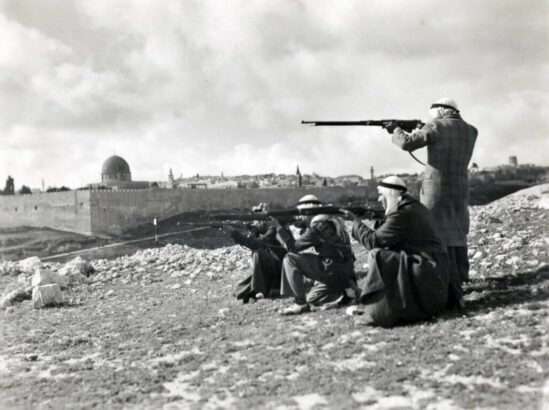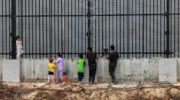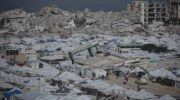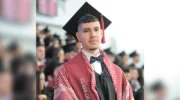“We have been brutalized, bereaved, dispossessed, exiled, starved, slaughtered and imprisoned, but there is more to our reality… Zionism may remain a formidable opponent, but it is also an aging, trembling beast.”
by Mohammed el-Kurd, reposted from Mondoweiss, May 15, 2024
Every year since I started writing, whether in Arabic or English, I have produced various iterations of the same essay or poem on Nakba Day, riddled with the same facts and figures and tired arguments, in hopes that one day such persuasion and schooling would no longer be necessary.
The thesis has been consistent: pairing “anniversary” and “Nakba” in the same sentence is a misalliance; the time frame, 76 years, is a miscalculation. The English translation—“Catastrophe”—is reductive, because it wasn’t a sudden natural disaster. Nor is it a tragic relic from the past. The Nakba is an organized and ongoing process of colonization and genocide that neither began nor ended in 1948. The perpetrators have names and the crime scene remains active. And where you cannot see the rubble, know that pine trees have been planted on top of it, to conceal it.
I read that, in Gaza, they have opened a new kindergarten in the North, a phoenix of sorts, and I want to believe that there is already a clean scent of jasmine that follows the teachers as they go about their day — what, if not jasmine, can ease the nagging of children and the nagging of warplanes?
I have been holding on to this piece of good news for the past couple of weeks, filling in the blanks with my own speculations. There is jasmine because seeds do not need permission, or a ceasefire, to germinate. Children nag because that is what children do. What do five-year-olds learn, besides the numbers and alphabet, in the time of genocide? What jokes do they tell to pass the time? Their vocabulary expands, naturally, to include words more brutal than “invasion,” “siege,” and “Nakba,” and their teachers, I imagine, tell them that the Nakba, the original Nakba (1947-49), pales in comparison to Gaza’s present. Even the rich — all of the rich — are in tents this time around.
It is hard to predict how we will historicize this current moment, but if our reflections on the late forties are any indication, we might remember only today’s destruction and defeat. And for good reason — at this very moment, with no hyperbole, our people’s corpses have been piled up in mass graves, plural, their wrists, big and tiny alike, bound with zip-ties.
Horrors that we once learned as oral histories and cautionary tales are livestreamed today, incessantly, forever etched in our memories. The past seven months have shown us that even metaphor is a casualty of war. What was once figurative is painfully literal: bloodied beards, furniture in trees, a limb hanging from a ceiling fan, women giving birth on the concrete. Clichés cover the terrain: plants erupting through rubble, flowers springing from cement, etcetera.
The surreal happens so much. Journalists are poets, almost, when reporting about the decomposed under ruins. Doctors have invented acronyms for conditions my fiction professors would have called unrealistically episodic. Death is everywhere.
And so when one begins to write or speak about Palestine, it is tempting to look at loss and only loss, and to find in this loss a plea for survival. We have suffered a lot, we say to those who will listen, we have suffered enough.
Too often our suffering is reported without a culprit, our anguished cries exist outside of history and politics. We have no national aspirations, no land to cultivate. Our existence is purely mechanistic — we are reminded, through policy and procedure, that we are unfortunately born to die.
And in our deterministic march to the grave, we encounter each other as unlucky strangers, frail and futureless.
But there is — and always has been — more to our reality. We are, without a doubt, subjects of conquest and colonization, products of circumstance, but we are also so much more than that. At every turn of our bloodied history, we have been brutalized, bereaved, dispossessed, exiled, starved, slaughtered and imprisoned, but we have, to the world’s dismay, refused to submit.
For every massacre and invasion, there have been and there are now men and women who pick up their weapons, makeshift and sophisticated — Molotovs, rifles, slingshots, rockets — to fight.
There has always been struggle, there has always been jasmine.
In parallel, there is also more to our enemy. Zionism, behind the facade of the impenetrable superpower it purports to be, is more vulnerable today than ever. And I do not say this naïvely: I do not ask that we gloss over our enemy’s capabilities or the power of the empires and mercenaries that back it. Nor do I ask that we trivialize the crushing weight of forty thousand martyrs, or glamorize the men confronting tanks in tracksuits and burden them with more than they can handle.
Freedom fighters understand that their opponent is Goliath, that the odds are stacked against them, that they do not have an option but to pick up the stone.
But this is a new dawn.
Through close inspection — watching state media, listening to the shifting global narrative, witnessing the renaissance of radical movements, even reading the inscriptions in random airport bathrooms — one discovers that this is a new dawn.
Zionism may remain a formidable opponent, but it is also an aging, trembling beast, blinded by its own significance, unpredictable as it may be. Sometimes it pounces on you and pierces its fangs in your flesh. Sometimes it is but a paper tiger.
And it is this discovery that not only shatters the myth of colonial invincibility, but it reminds us that liberation is attainable, the future is within reach. Amid the unrelenting airstrikes and the havoc of demolished cities, it might seem frivolous to fixate on the blossoming jasmine. But we owe it ourselves to look at everything, to look for everything. To see the picture with all of its details.
As deadly and treacherous and unrelenting as it is, the Nakba will not last forever. The world is changing because it must. If seeds can germinate in the inferno, so can revolution. On the phone, my mother tells me, rain is coming and God is almighty.
Mohammed El-Kurd
Mohammed El-Kurd is a writer and poet from Jerusalem, occupied Palestine. He is the Culture Editor at Mondoweiss.
RELATED ARTICLES:
- New! English translation of eyewitness Red Cross account of 1948 Deir Yassin massacre
- Palestinians rally at historic villages in northern Israel
- The West’s complete contempt for the lives of Palestinians will not be forgotten
- Israeli lawmaker regrets that ethnic cleansing of Palestinians was not completed
- Israeli anti-Zionist academic Ilan Pappe interrogated by FBI in Detroit
- Ilan Pappe, Jacobin: No, Israel Is Not a Democracy – And Never Was





